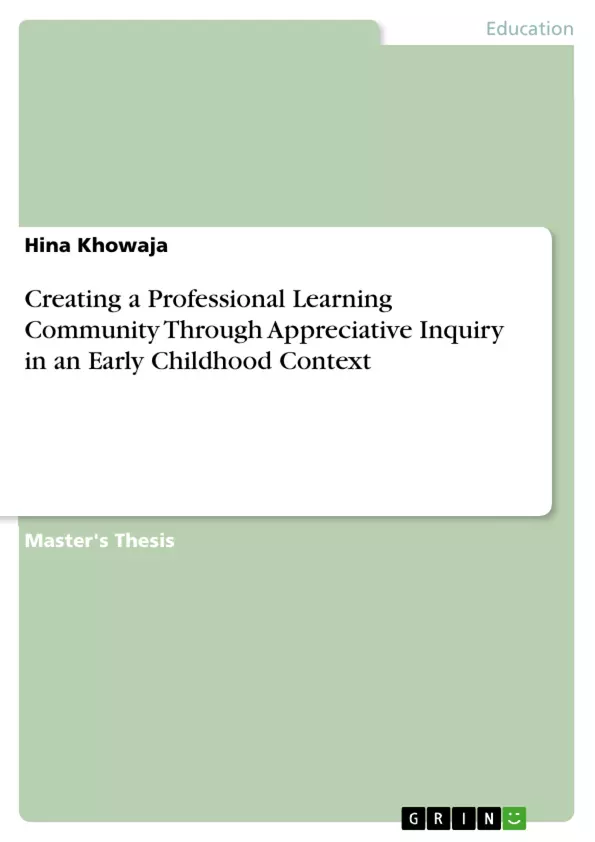This study explored the factors that were required for creating an environment based on a professional learning community (PLC) that not only provides support to teachers on a regular basis for their development, but also builds a collaborative learning environment for the teachers in the school particularly in the early childhood development (ECD) context.
Further, this study also identified the processes that helped to build PLC using the appreciative inquiry approach. In addition, the support of appreciative inquiry as an approach for building PLC was also measured. Eight research participants were selected who were involved in four stages of appreciative inquiry, namely discovery, dream, design and destiny. The data revealed that trust, collaborative learning and reflective dialogue were some of the factors that are required for creating a PLC environment. However, three processes for initiating PLC culture were included which are classroom teaching and observation, constructive feedbacks and reflective dialogue sessions.
At the end, this research found that the appreciative inquiry approach was significant as a value-added tool that helped to build the collaborative environment in the school and provided participants an opportunity to share their skills and expertise as well as their dreams and imaginations with each other.
Inhaltsverzeichnis (Table of Contents)
- Chapter one: Introduction
- Background and Context of Study
- Statement of the Problem
- Significance of the Study
- Research Questions
- Definition of Key Terms
- Organization of this Dissertation
- Chapter Two: Literature Review
- Professional Learning Community
- Shared Vision and Values
- Collective Focus on Learning
- Collaboration
- Reflective Dialogue
- De-Privatized Practices
- Appreciative Inquiry
- Discover
- Dream
- Design
Zielsetzung und Themenschwerpunkte (Objectives and Key Themes)
This dissertation aims to explore the factors required for creating a professional learning community (PLC) environment in an early childhood development (ECD) context, specifically identifying the processes that facilitate building a PLC using an appreciative inquiry approach. The study also measures the effectiveness of appreciative inquiry as a tool for building a PLC.
- Creating a professional learning community environment in early childhood education.
- Identifying the processes for building a PLC using appreciative inquiry.
- Measuring the effectiveness of appreciative inquiry in building a PLC.
- Exploring the factors that contribute to a successful PLC, such as trust, collaboration, and reflective dialogue.
- Analyzing the role of appreciative inquiry in fostering a collaborative learning environment within the school setting.
Zusammenfassung der Kapitel (Chapter Summaries)
Chapter one introduces the background and context of the study, outlining the problem statement, significance, research questions, key terms, and the dissertation's organization. Chapter two provides a comprehensive literature review on professional learning communities, emphasizing shared vision and values, collective focus on learning, collaboration, reflective dialogue, and de-privatized practices. The chapter also delves into the concept of appreciative inquiry, outlining its four stages: discovery, dream, design, and destiny.
Schlüsselwörter (Keywords)
The key focus areas of this study are professional development, capacity building, professional learning community, appreciative inquiry, and the ECD context. The research explores the use of appreciative inquiry as a tool for building a collaborative learning environment in an early childhood setting, emphasizing the importance of trust, collaboration, and reflective dialogue.
Frequently Asked Questions
What is a Professional Learning Community (PLC)?
A PLC is a collaborative environment where teachers work together, share expertise, and engage in reflective dialogue to improve their teaching and student learning.
How can Appreciative Inquiry help build a PLC?
Appreciative Inquiry focuses on strengths and successes rather than problems, using stages like Discovery and Dream to foster a positive, collaborative culture.
What are the key factors for a successful PLC?
Critical factors include trust among staff, shared vision and values, collaborative learning, and regular reflective dialogue.
What are the four stages of Appreciative Inquiry?
The four stages are Discovery (finding what works), Dream (imagining what could be), Design (planning the future), and Destiny (implementing changes).
Why is PLC important in early childhood development (ECD)?
In ECD, a PLC provides teachers with essential support for their professional development and helps create a better learning environment for young children.
What are "de-privatized practices" in teaching?
It refers to moving away from teaching in isolation by opening classrooms for observation and constructive feedback from colleagues.
- Quote paper
- Hina Khowaja (Author), 2015, Creating a Professional Learning Community Through Appreciative Inquiry in an Early Childhood Context, Munich, GRIN Verlag, https://www.grin.com/document/369648



